
Publications
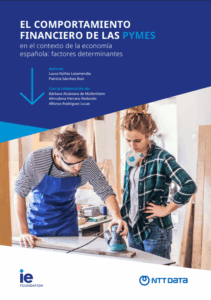
The Financial Behavior of SMEs in the Context of the Spanish Economy: Determinant Factors
Author: Laura Núñez Letamendia, Patricia Sánchez Ruiz
The report analyzes the financial behavior of Spanish micro and small businesses, focusing on how financial knowledge, planning skills, attitudes toward risk and ESG, and access to advice and digital tools influence financing and risk management. Using data from the 2021 Financial Competency Survey of Small Businesses (Banco de España) with 1,120 companies, it aims to identify factors that strengthen decision-making, sustainability, and competitiveness in the SME sector.
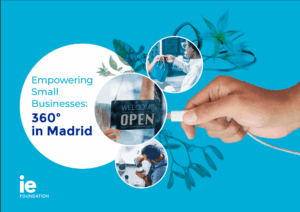
Empowering Small Businesses: 360º in Madrid
Author: Concepción Galdón, Poliana Muñoz, Eugenia Gutiérrez
This report examines the impact of a training and mentoring program on 206 micro- and small-business owners in Madrid. It evaluates participants’ progress in finance, management, marketing, and digital presence, highlighting improvements in revenue, skills, resilience, and networking. Through surveys, focus groups, and case studies, it shows how tailored training and community connections can strengthen small enterprises and prepare them for growth in a challenging economic environment.

Innovation Beyond Technology: The Crucial Role of Skills in Driving Change in the Legal Profession: Perspectives from Lawyers at Major Firms in Spain
Author: Antonio Alosi, Pilar Galeote, Nicolas Parra Herrera
The report investigates how innovation in the Spanish legal profession transcends mere technological adoption to include organizational transformation and the cultivation of interpersonal and ethical competencies. Based on a survey of 460 lawyers from major firms in Madrid, it reveals that AI is valued as an efficiency booster but is not seen as a substitute for human judgment.
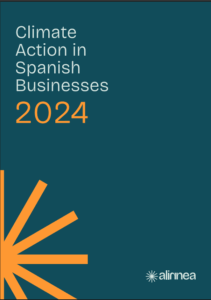
Climate actions in Spanish businesses 2024
Author: María Isabel Martínez Martín, Rosa Santero Sánchez, César Herreros Castillo
This report examines how Spanish companies are addressing climate change. It explores perceptions of climate risks, the current state of corporate climate initiatives, their effects on competitiveness—such as innovation, supply chain management, internationalization, and financing—and the costs and barriers businesses face. The report also outlines strategies and supports needed to accelerate meaningful climate action among Spanish enterprises.
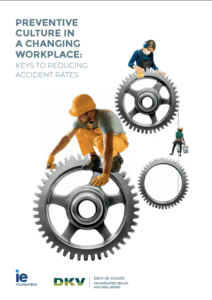
Preventive Culture In A Changing Work Environment: Key Strategies To Reduce Workplace Accidents
Author: Rocío Bonet, Ignacio Pardillo
This report explores how modern workplace trends—like temporary hiring, frequent role rotations, and outsourcing—can undermine occupational safety by compromising employee training and integration into company safety norms. Combining statistical and qualitative insights, it highlights a clear link between workforce flexibility and increased accident rates. It advocates for turning safety into a strategic priority, recommending stronger preventive training, leadership that visibly models safety, inclusive onboarding for temporary staff, and positive, practice-oriented communication to cultivate a robust safety culture.
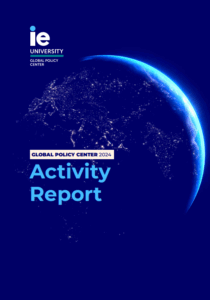
Global Policy Center 2024 Activity Report
Author: Luis de Lossada i Gallart
The report presents the inaugural-year activities of the GPC, an applied research hub established in September 2023. It outlines the center’s primary research themes—such as the Future of Europe, Transatlantic Relations, Bridging the Global South(s), Global Governance, and regional observatories on Latin America, China, and Africa—highlighting key projects and events like the Madrid–Barcelona Future of Europe Debates, Transatlantic Bridge, and Global Bridges initiative. It also details the GPC’s participation in external forums, media outreach, publications, executive education programs, partnerships, and the team driving its mission to bridge academic research and policymaking.
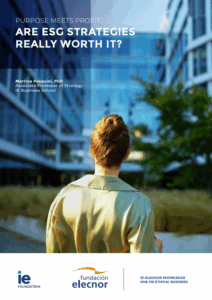
Purpose Meets Profit: Are ESG Atrategies Really Worth It?
Author: Martina Pasquini
This report examines how different types of ESG strategies—ranging from philanthropic giving and social innovation to governance reforms—impact business value. Through an analysis of purpose-driven companies recognized for their ethical practices, the study finds that well-designed ESG initiatives can indeed drive value: philanthropic and social-impact strategies boost profitability and capital efficiency; focused sustainable innovation enhances sales growth and market value; and governance strategies increase intangible brand value and stakeholder trust.
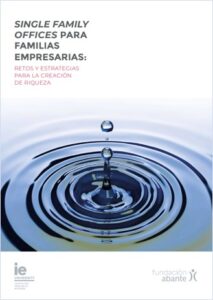
SINGLE FAMILY OFFICES PARA FAMILIAS EMPRESARIAS: RETOS Y ESTRATEGIAS PARA LA CREACIÓN DE RIQUEZA
Author: Cristina Cruz, Laura Jiménez, Fernando Oliveros
This report aims to help business families to clearly define the purpose of their wealth and, based on this purpose, to establish a plan of continuity that will allow them to create wealth over multiple generations. To this end, the report is not limited to listing best practices, but based on the authors’ expert knowledge of business family behavior and wealth management, offers an in-depth reflection on the challenges for business families in managing shared wealth and on the keys to successfully managing it.
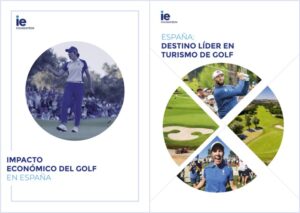
II Estudio sobre el Impacto Económico del Golf en España
Author: Juan Santaló
The study shows that the golf industry continues to generate a significant economic impact, not only for its direct contribution to GDP, but also for attracting quality tourism, employment and promoting sustainable development in various regions of the country. According to the report’s data, golf is consolidating its position as a strategic tool for boosting economic growth, especially in areas with high tourism activity.
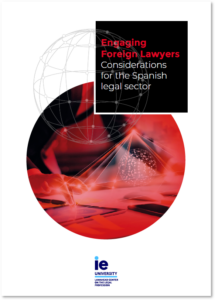
ENGAGING FOREIGN LAWYERS: CONSIDERATIONS FOR THE SPANISH LEGAL SECTOR
Author: Johanna Jacobsson
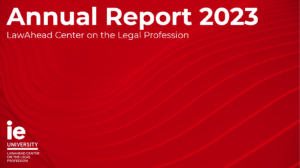
IE LAWAHEAD CENTER ON THE LEGAL PROFESSION’S ANNUAL REPORT 2023
Editors: Cristina Andrés & Mari Cruz Taboada

¿EXISTE UN «FAMILY PREMIUM» EN LA EMPRESA COTIZADA CHINA?
Authors: Cristina Cruz & Laura Jiménez with Banca March A. M.
This study examines the existence of a “family premium” in the Chinese stock market, i.e. whether companies controlled by a founder or a family group are more profitable than other listed companies in the Asian giant. For this purpose, the CSMAR (China Stock Market & Accounting Research) database was used to analyze 4250 companies listed on the Shanghai and Shenzhen stock exchanges from 2005 to 2020. The results reveal the existence of a “family premium” in the Chinese stock market, suggesting that the advantages of family ownership are reflected even in a context as different as the Chinese market.
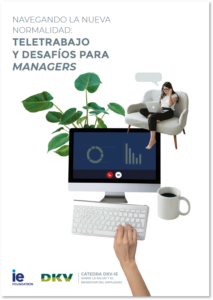
NAVEGANDO LA NUEVA NORMALIDAD: TELETRABAJO Y DESAFÍOS PARA MANAGERS
Written in Spanish & English
Authors: Rocío Bonet, Marco Minervini & Ignacio Pardillo
This first report published by the DKV-IE Chair, analyzes the impact that teleworking has on the well-being of managers and the factors that affect this impact.
One of the most striking findings of this study, based on a survey of 415 managers of teams in Spain, all of them from different sectors and with jobs that can be performed remotely, is that 25% of managers give up some of the telework days offered by the company, even though they would like to telework more.
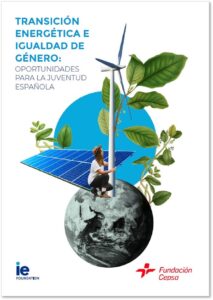
TRANSICIÓN ENERGÉTICA E IGUALDAD DE GÉNERO: OPORTUNIDADES PARA LA JUVENTUD ESPAÑOLA
Written in Spanish & English
Authors: Custodia Cabanas, Patricia Gabaldón & Kostantina Valogianni
This report jointly produced by the IE Foundation and the Cepsa Foundation proposes the energy transition as one of the most important challenges facing today’s society. To ensure its success, the energy transition should favor gender equality, i.e., it should guarantee, among other parameters, an equal distribution of job opportunities between men and women. On the other hand, it should also incorporate the younger generations, since their priorities and concerns will set the political, economic and social agenda for the coming decades.
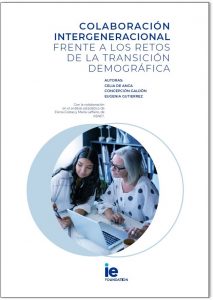
COLABORACIÓN INTERGENERACIONAL FRENTE A LOS RETOS DE LA TRANSICIÓN DEMOGRÁFICA
Authors: Concepción Galdón, Celia de Anca, Eugenia Gutierrez
This fourth report by IE Foundation’s Demographics and Generational Diversity Observatory represents a work of applied research that aims to contribute to the agenda of initiatives needed to manage the increase of the senior population in organizations and the new intergenerational realities.
Its co-production has been a joint effort of IE Foundation’s Observatory of Demographics and Generational Diversity with the collaboration of the Banco Interamericano de Desarrollo (BID), BID Lab, MAPFRE, Plan Mayor y Fundación SERES. The organizations aim to promote, through the generation of knowledge, social debate on the implications of the demographic transition for social actors, including companies, and the need to promote collaboration between generations as a strategy for creating economic and social value.

DIGITAL TRANSFORMATION FOR INCLUISVE BUSINESS DEVELOPMENT
Third edition
Written in English & Spanish
Authors: Concepción Galdón, Poliana Muñoz, Eugenia Gutierrez
Digital Transformation for Inclusive Business Development is a project supported by J.P. Morgan and Madrid City Council, in collaboration with Orange, and delivered by IE Foundation.
Through the third edition of this project, 201 small business owners (SBOs) in Madrid, struggling to keep their businesses open due to the crisis brought about by the pandemic, are developing the capacity to implement e-commerce and online marketing strategies. Delivered in a remote format, which proved successful in the second iteration, the project is designed to accelerate the ability of the beneficiaries to generate additional revenues by leveraging online channels.

PRÁCTICA Y POLÍTICA DE COMPLIANCE Y SOSTENIBILIDAD EN ÁMERICA LATINA
CASOS DE ESTUDIO EN BRASIL, CHILE Y MÉXICO
Authors: Patricia Gabaldón, Marie-José Garot, Joaquín Garralda y Ruiz de Velasco, Katharina Miller
Prepared by a superb team of researchers from IE – Elecnor Observatory on Sustainable Compliance Cultures and IE Foundation, this study reflects the barriers, challenges, opportunities and best practices identified during the analysis of the reality of each of the countries examined and sets out the lessons learned, so that they can be applied in Latin America as well as in other parts of the world.
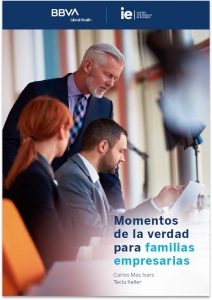
MOMENTOS DE LA VERDAD PARA FAMILIAS EMPRESARIAS
Authors: Carlos Mas Ivars & Tecla Keller
IE Center for Families in Business and BBVA Global Wealth develop a study that analyzes the nine “moments of truth”, in which families in business must take decisions to reinforce their strategy. Through this report, both centers strengthen the strategic counselling of families in business from Spain, Switzerland and Latin America.
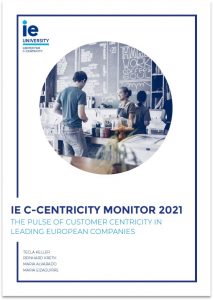
C-CENTRICITY MONITOR 2021
THE PULSE OF CUSTOMER CENTRICITY IN LEADING EUROPEAN COMPANIES
Authors: Tecla Keller, Reinhard Kreth, María Alvarado & María Eizaguirre
The IE C-Centricity Monitor is an initiative to advance and leverage knowledge in the field of C-Centricity, meaning Customer, Consumer, and Citizen Centricity. It is based on a quantitative survey of a wide range of international and multi-sectorial companies, supplemented by in-depth interviews.
The IE C-Centricity Monitor generates and shares a unique and objective vision of the state of C-Centricity in the business world – its implementation profile, the challenges it faces, and its evolution over time – through systematic measurement. The study leverages our comprehensive, cross-functional understanding of C-Centricity, based on the IE C-Centricity Net, and our academic research on the C-Centricity Model, which it also fuels with relevant empirical data.
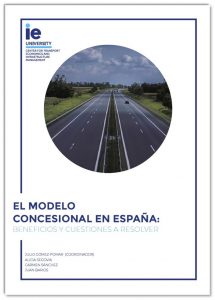
EL MODELO CONCESIONAL EN ESPAÑA
BENEFICIOS Y CUESTIONES A RESOLVER
Authors: Alicia Segovia, Carmen Sánchez and Juan Barios. Coordinator: Julio Gómez-Pomar
In this report, the role played by the concession model in public service provision is analyzed in detail. The most important conclusion is that, despite all concessions’ advantages, it is hardly ever used in Spain. While the reasons may vary widely, the result is that chances to improve our infrastructure and provide better services are being lost, while our companies are successfully participating in and executing these contracts abroad.

BUSINESS SCHOOLS FOR CLIMATE CHANGE
Authors: Cambridge Judge Business School, HEC Paris, IE Business School, IESE Business School, the International Institute for Management Development (IMD), INSEAD, London Business School, and Saïd Business School (University of Oxford).
Business Schools for Climate Leadership (BS4CL) is a substantive collaboration of eight founding leading European business schools, joining together to help business leaders combat the climate crisis facing the planet.
BS4CL represents, therefore, the beginnings of collective action across business schools starting with the founding members in order to incite, support, and mobilize as many stakeholders as possible to protect humanity.
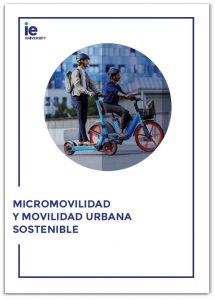
MICROMOVILIDAD Y MOVILIDAD URBANA SOSTENIBLE
Authors: Enrique Dans and Gildo Seisdedos
In this report, Enrique Dans and Gildo Seisdedos offer a detailed analysis of the new alternatives to the traditional ways of mobility, i.e., sustainable micromobility. As the number of people that live in cities rises, the dangers of contamination keep increasing. In order to develop sustainable alternatives, private and public sector must join forces and offer citizens a type of mobility that allows them to move in a fast, safe and sustainable manner.
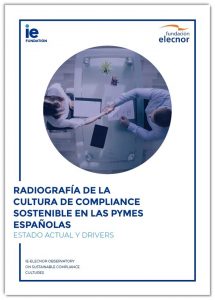
RADIOGRAFÍA DE LA CULTURA DE COMPLIANCE SOSTENIBLE EN LAS PYMES ESPAÑOLAS
ESTADO ACTUAL Y DRIVERS
Authors: Marie-José Garot, Joaquín Garralda Ruíz de Velasco, Katharina Miller, Antti Tenhiälä.
Carried out by a multidisciplinary team and experts in law, compliance, sustainability and operations analysis from IE University, this study is unique for its scientific rigor and original approach. It is based on robust psychometric and statistical methodologies that identify the main “determinants” of the culture of compliance and sustainability in Spanish SMEs – a concept that is especially difficult to capture and measure.
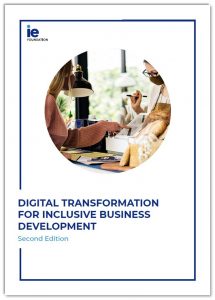
DIGITAL TRANSFORMATION FOR INCLUSIVE BUSINESS DEVELOPMENT
Second edition
Authors: Concepción Galdón, Aloña Martiarena. Johanna Andrango
Digital Transformation for Inclusive Business Development is a project supported by J.P. Morgan and delivered by the IE Foundation, the foundation of IE University, which has extensive experience in remote training, in collaboration with the City of Madrid and Orange. Through this project, small business owners (SBOs) in Madrid that are struggling to keep their businesses open due to the pandemic have developed their capacity to implement e-commerce and online marketing strategies. Delivered remotely, the project accelerated the beneficiaries’ ability to generate additional revenues by leveraging online channels. This project capitalizes on all the learning from the pilot project IE Foundation implemented in 2018-19 thanks to support by J.P. Morgan.
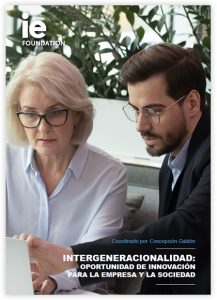
Intergenerationality
An Innovation Opportunity for Business and Society
Authors: Concepción Galdón, Rafael Puyol, Terry Huang, Laura MacDermott, Bárbara Rey Actis
Demographic transformation implies a socio-cultural change that affects companies in their relationship with employees, customers, and the conceptualization of their products. This report proposes an approach to this phenomenon from the perspective of intergenerationality.
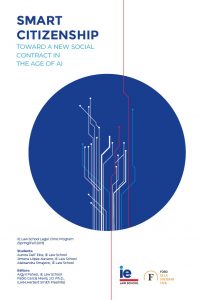
Smart Citizens
Toward a New Social Contract in the Age of AI
Authors: IE Law School
One particularly clear issue that arises from the widespread use of algorithms is a lack of awareness. The main purpose of this study is to set the guidelines for legislators to create a new and global context which facilitates to rule the emerging technologies.

To help someone who has experienced a toxic relationship or sexual violence
Purple Useful Information
Authors: IE University
Guide on how to help someone who has experienced or is experiencing a traumatic relationship.
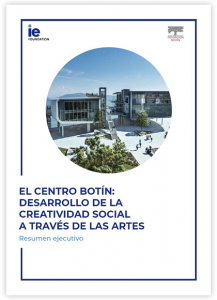
El centro Botín: Desarrollo de la creatividad social a través de las artes
Resumen ejecutivo
Authors: Patricia Gabaldón, Laura Zimmerman
Center: IE Foundation
This report addresses how the artistic and cultural activities at the Botín Center is closely related to changes in the creativity and with the creation of personal and social benefits.
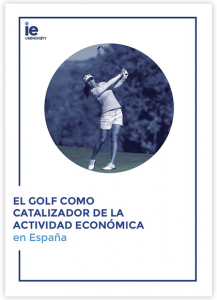
El golf como catalizador de la actividad económica en España
Author: Juan Santaló
Center: IE University
The main purpose of this study is to estimate the importance of the golf sector in the Spanish economy and it gives a number: 4,640 EUR millions.
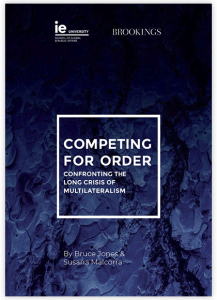
Competing for order
Confronting the long crisis of multilateralism
Authors: Bruce Jones, Susana Malcorra
Center: IE School of Global & Public Affairs
This paper is designed to help governments in the process of answering this question: can the multilateral order be revamped in the face of mounting geopolitical tension, divisions over globalization, and rapid technological change?
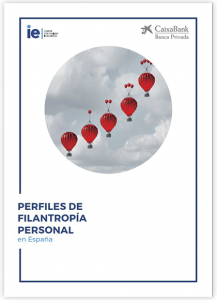
Perfiles de filantropía personal en España
Authors: Cristina Cruz, Rachida Justo
Center: IE Center for Families in Business
This report aims to bring the figure of the philanthropist closer to the general public and to place value on their efforts.
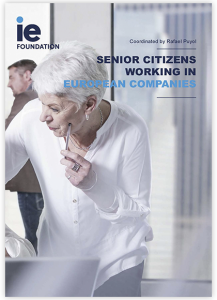
Senior Citizens Working in European Companies
Authors: Rafael Puyol, Íñigo Sagardoy, Gisella Alvarado, Alfonso Jiménez, Beatriz Ardid, Elena Orden, Cristina Morillo-Velarde
Center: IE Center for Diversity
The comparison of the active and employed population aged 55 and over in Spain yielded unfavorable balances in relation to other EU territories. The objective of this study is to find out what is being done in other countries with respect to this segment of the working population.
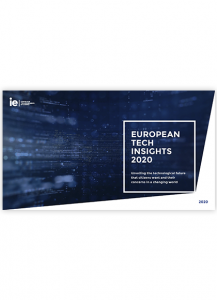
European Tech Insights 2020
Unveiling the technological future that citizens want and their concerns in a changing world
Authors: Carlos Lastra-Anadón, Diego Rubio
Center: IE Center for the Governance of Change
This study is the result of the collaboration with the Global Corporation Center and Egon Zehnder. Its purpose is to help defining the functions and responsibilities of the coordinating director.
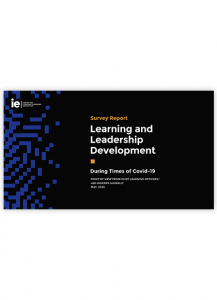
Learning and Leadership Development
Author: IE Center for Corporate Learning Innovation
Center: IE Center for Corporate Learning Innovation
The IE Center for Corporate Learning Innovation has reached out to over 60 Chief Learning Officer’s and L&D Leaders globally to learn about important initiatives and best practices in order to conduct this survey report.
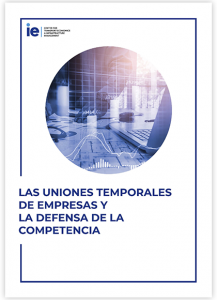
Las uniones temporales de empresas y la defensa de la competencia
Author: Julio Gómez-Pomar
Center: IE Center for Transport Economics & Infrastructure Management
The purpose of this study is to bring to light the controversy and to settle the disputes arising from the TBA economic sense and the current Spanish competitive environment.
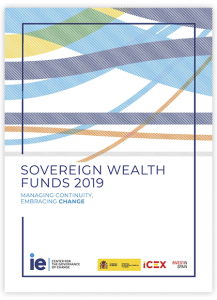
Sovereign Wealth Funds 2019
Managing continuity, embracing change
Authors: Javier Capapé, Patrick J. Schena, Paul Rose, Diego López
Center: IE Center for the Governance of Change
This report takes a close look at the greater participation of SWF in the most disruptive technologies, and also analyzes one of the most promising and novel aspects of the activity of these funds.
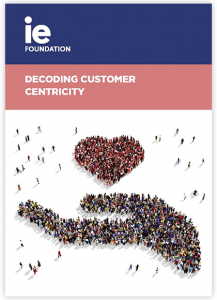
Decoding Customer Centricity
Authors: María Eizaguirre, María Alvarado
Center: IE Center for C-Centricity
This study is an attempt to decode what Customer Centricity actually is and whether it is the same as the commitment by companies to consider customers as central to their business model.

Crypto-currencies and the future of money
Executive Report
Author: IE Center for the Governance of Change
Center: IE Center for the Governance of Change
The purpose of this report is to provide a comprehensive overview of how crypto-currencies could be used to achieve this purpose.
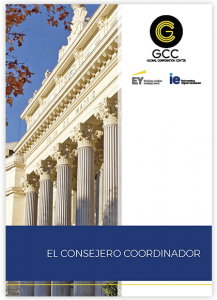
El consejero coordinador
Authors: Juan Riva de Aldama, Miguel Ferre, Lourdes Centeno, Pablo Sagnier
Center: Global Corporation Center
This study is the result of the collaboration with the Global Corporation Center and Egon Zehnder. Its purpose is to help defining the functions and responsibilities of the coordinating director.
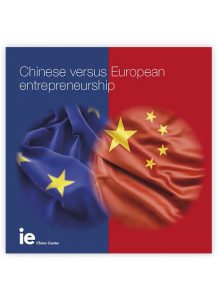
Chinese versus European entrepreneurship
Authors: José Félix Valdivieso, Bin Ma, Pedro Gete, Rafael Bueno, Nacho Mateo
Center: IE China Center
Comparison report of Chinese and European entrepreneurs that studies how, despite their very different historical, cultural and political contexts, they are more similar than they are different.
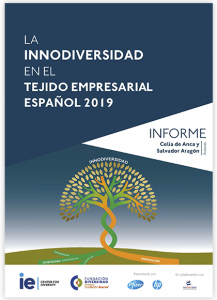
La innodiversidad en el tejido empresarial español 2019
Authors: Celia de Anca, Salvador Aragón
Center: IE Center for Diversity
The COVID-19 pandemic has required the creation of crisis management teams in companies, institutions and governments. This study has confirmed that the most diverse a team is; the best results it achieves. Companies that manage jointly diversity and innovation are more competitive.
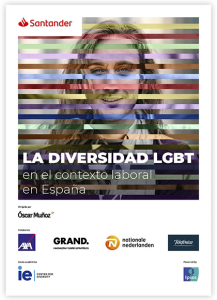
La diversidad LGTB en el contexto laboral en España
Author: Óscar Muñoz
Center: IE Center for Diversity
Spain is internationally recognized as one of the most advanced countries in terms of the legislation and the rights protection policies for the people with diverse sexual orientation or identity. However, studies prove that, sometimes, the sociocultural reality goes slower than the laws.
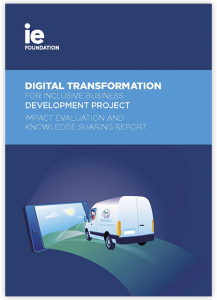
Digital transformation for inclusive business development project
Impact evaluation and knowledge sharing report
Authors: Concepción Galdón, Aloña Martiarena, Laura Hernández
Center: IE Foundation
This project is aimed at designing, developing and testing a methodology to promote technology adoption among small business owners.
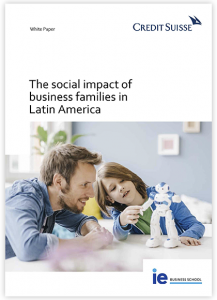
The social impact of business families in Latin America
Authors: Cristina Cruz, Rachida Justo, Laura Jiménez, Jeanne Roche
Center: IE Business School
The first objective of this White Paper is to enhance the contribution of business families on the generation of social impact in Latin America.
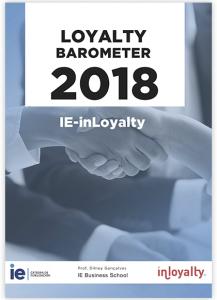
Loyalty barometer 2018
IE-inLoyalty
Author: Dilney Gonçalves
Center: IE Cátedra de Fidelización
This study unique in Spain allow us to understand the importance that companies place in acquisition and retention, whether and how this importance translates to investment, and what are the means companies use to achieve each goal.
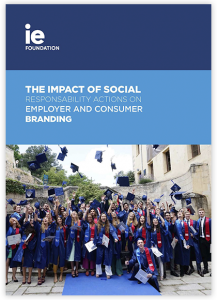
The impact of social responsability actions on employer and consumer branding
Authors: Marco Giarratana, Martina Pasquini
Center: IE Foundation
The core part of this project was a scenario-based survey with more than 1,000 respondents. The main results show that actions that are geographically near to the respondent and to the core business of the company generate positive influence on all the core variables.
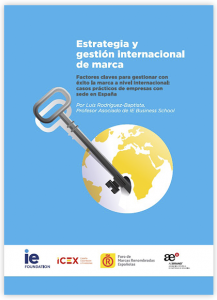
Estrategia y gestión internacional de marca
Factores clave para gestionar con éxito la marca a nivel internacional: casos prácticos de empresas con sede en España
Author: Luis Rodríguez-Baptista
Center: IE Foundation
The main purpose of this report is to share the lessons learned by successful companies on international branding management.
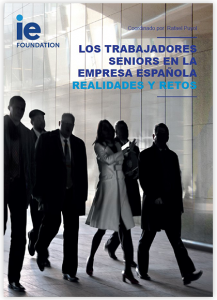
Los trabajadores seniors en la empresa española
Realidades y retos
Authors: Daniel Reher, Miguel Requena, Rafael Puyol, Beatriz Ardid, Elena Orden, María Padilla
Center: IE Center for Diversity
This report analyzes the issue of the demographic ageing in the workplace in Spain. The study shows that the importance of the senior workers will grow in the next years, which will result in a longer working life for many.
